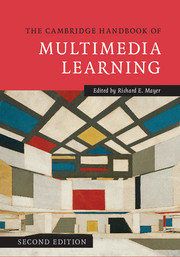The Cambridge Handbook of Multimedia Learning (2nd Ed.) Cambridge Handbooks in Psychology Series
Langue : Anglais
Coordonnateur : Mayer Richard E.

In recent years, multimedia learning, or learning from words and images, has developed into a coherent discipline with a significant research base. The Cambridge Handbook of Multimedia Learning is unique in offering a comprehensive, up-to-date analysis of research and theory in the field, with a focus on computer-based learning. Since the first edition appeared in 2005, it has shaped the field and become the primary reference work for multimedia learning. Multimedia environments, including online presentations, e-courses, interactive lessons, simulation games, slideshows, and even textbooks, play a crucial role in education. This revised second edition incorporates the latest developments in multimedia learning and contains new chapters on topics such as drawing, video, feedback, working memory, learner control, and intelligent tutoring systems. It examines research-based principles to determine the most effective methods of multimedia instruction and considers research findings in the context of cognitive theory to explain how these methods work.
1. Introduction Richard E. Mayer; Part I. Theoretical Foundations: 2. Implications of cognitive load theory for multimedia learning Fred Paas and John Sweller; 3. Cognitive theory of multimedia learning Richard E. Mayer; 4. Integrated model of text and picture comprehension Wolfgang Schnotz; 5. The four-component instructional design model: multimedia principles in environments for complex learning Jeroen J. G. van Merrienboer and Liesbeth Kester; Part II. Basic Principles of Multimedia Learning: 6. Ten common but mistaken principles of multimedia learning Richard E. Clark and David F. Feldon; 7. The multimedia principle Kirsten R. Butcher; 8. The split-attention principle in multimedia learning Paul Ayres and John Sweller; 9. The modality principle in multimedia learning Renae Low and John Sweller; 10. The redundancy principle in multimedia learning Slava Kalyuga and John Sweller; 11. The signaling principle in multimedia learning Tamara van Gog; 12. Principles for reducing extraneous processing in multimedia learning: coherence, signaling, redundancy, spatial contiguity, and temporal contiguity principles Richard E. Mayer and Logan Fiorella; 13. Principles for managing essential processing in multimedia learning: segmenting, pre-training, and modality principles Richard E. Mayer and Celeste Pilegard; 14. Principles based on social cues: personalization, voice, image, and embodiment principles Richard E. Mayer; Part III. Advanced Principles of Multimedia Learning: 15. The guided discovery principle in multimedia learning Ton de Jong and Ard W. Lazonder; 16. The worked examples principle in multimedia learning Alexander Renkl; 17. The self-explanation principle in multimedia learning Ruth Wylie and Michelene T. H. Chi; 18. The generative drawing principle in multimedia learning Detlev Leutner and Annett Schmeck; 19. The feedback principle in multimedia learning Cheryl I. Johnson and Heather A. Priest; 20. The multiple representations principle in multimedia learning Shaaron Ainsworth; 21. The learner control principle in multimedia learning Katharina Scheiter; 22. Animation principles in multimedia learning Richard K. Lowe and Wolfgang Schnotz; 23. The collaboration principle in multimedia learning Paul A. Kirschner, Femke Kirschner and Jereon Janssen; 24. The expertise reversal principle in multimedia learning Slava Kalyuga; 25. The individual differences in working memory capacity principle for multimedia learning Jennifer Wiley, Christopher A. Sanchez and Allison J. Jaeger; Part IV. Multimedia Learning of Cognitive Processes: 26. Multimedia learning of cognitive processes Susanne P. Lajoie; 27. Multimedia learning of metacognitive strategies Roger Azevedo; 28. Multimedia learning and the development of mental models Mary Hegarty; Part V. Multimedia Learning in Advanced Computer-Based Contexts: 29. Multimedia learning with intelligent tutoring systems Benjamin D. Nye, Arthur C. Graesser and Xiangen Hu; 30. Multimedia learning with simulations and microworlds Jan Plass and Ruth N. Schwartz; 31. Multimedia learning with computer games Sigmund Tobias, J. D. Fletcher, Benoit Bediou, Alexander P. Wind and Fei Chen; 32. Multimedia learning with video Sharon Derry, Miriam Gamoran Sherin and Bruce L. Sherin; 33. Multimedia learning from multiple documents Jean-Francois Rouet and Ann Britt; 34. Multimedia learning in e-courses Ruth Colvin Clark.
Richard E. Mayer is Professor of Psychology at the University of California, Santa Barbara. He served as President of the Division of Educational Psychology for the American Psychological Association (APA) and as Vice President of the Learning and Instruction Division for the American Educational Research Association (AERA). He has received many awards, including APA's E. L. Thorndike Award for career achievement in educational psychology and AERA's Sylvia Scribner Award. He has authored more than 400 publications, including 25 books, such as Applying the Science of Learning, Multimedia Learning, 2nd edition, Learning and Instruction, 2nd edition, and e-Learning and the Science of Instruction, 3rd edition (with R. Clark).
Date de parution : 07-2014
Ouvrage de 950 p.
17x24.4 cm
Disponible chez l'éditeur (délai d'approvisionnement : 14 jours).
Prix indicatif 121,34 €
Ajouter au panierThème de The Cambridge Handbook of Multimedia Learning :
© 2024 LAVOISIER S.A.S.



